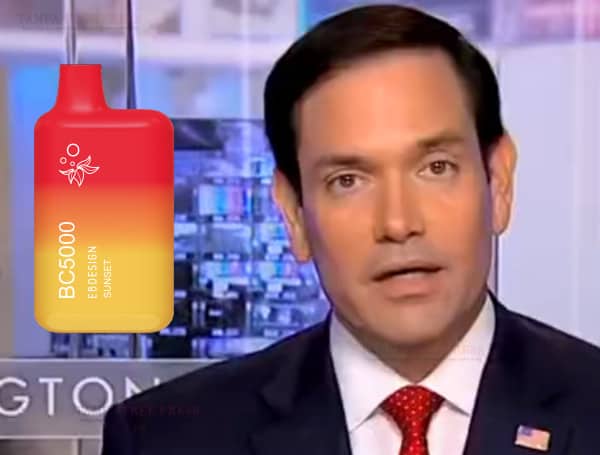Chinese companies have taken advantage of the U.S. Food and Drug Administration’s (FDA) lax enforcement by flooding the U.S. market with illegal vaping products.
The vast majority of Chinese vapes are not FDA-approved or regulated; as a result, millions of Americans are consuming untested and dangerous vaping products.
U.S. Senator Marco Rubio (R-FL) sent a letter to FDA Commissioner Robert Califf criticizing the FDA’s lack of effective enforcement against Chinese companies selling illegal vapes to Americans.
Read: Florida Supreme Court Justices Weigh Abortion Amendment
“Law-abiding American companies wait years, spend millions of dollars, and comply with strict restrictions on flavors and marketing in order to gain FDA approval for their products. Meanwhile, unscrupulous Chinese companies send shipping containers full of illegal e-cigarettes into our country every day, right under the nose of the FDA and U.S. Customs and Border Protection (CBP). FDA’s attempts at enforcement have proven totally inadequate,” said Rubio.
In a bold attempt to bypass the FDA ban on their products, a Chinese vaping company has resorted to a simple but effective tactic: a name change.
Despite efforts by U.S. regulators to block the import of Elf Bar, a popular Chinese disposable e-cigarette, the product remains widely available under a new name, EBCreate.
The ability of the Chinese vaping company to easily evade the FDA ban highlights the shortcomings of current regulations. Despite the FDA’s authority to regulate tobacco products, it has not implemented a system that requires unique identification codes on all FDA-regulated tobacco products.
This lack of a standardized tracking system makes it difficult for customs officials to identify and seize illegal vaping products.
Read: Florida Sens. Rubio And Scott Help Effort Boosting Awareness Of Fentanyl Risk For Seniors
A report by The Associated Press revealed that the number of unique e-cigarettes on the market has tripled since 2020, with over 9,000 different products available.
The surge in availability is primarily driven by Chinese-manufactured disposables, which often come in appealing candy and fruit flavors, making them popular among teenagers.
The Persistence of Elf Bar Despite the Ban
Elf Bar, the Chinese disposable e-cigarette brand, has continued to generate significant sales in the United States, surpassing $271 million in the past year alone.
The brand entered the U.S. market in November 2021 and achieved substantial sales before being targeted by FDA regulators.
Despite the import ban, Elf Bar quickly rebranded itself as EBCreate, allowing it to maintain its presence in stores across the country.
The Speed of Rebranding and Trademarking
Public records reveal the speed at which Elf Bar was able to rebrand itself following the FDA’s import ban. Within two weeks of the ban announcement, a trademark request for EBCreate was filed with the U.S. Patent and Trademark Office.
Interestingly, the paperwork filed for EBCreate does not mention Elf Bar’s parent company, iMiracle Shenzhen Technology. Instead, it lists a Hong Kong company, Nevera HK Limited, as the trademark owner.
To maintain authenticity and familiarity with customers, the new EBCreate products feature the same QR code found on Elf Bar packages.
Additionally, they bear the same licensing code assigned by Chinese tobacco authorities. These similarities between the banned Elf Bar and the rebranded EBCreate raise concerns about the effectiveness of regulatory measures.
Read: Florida Sen. Rubio Questions Why Biden Admin No Longer Wants NIH To “Lengthen Life” For Americans
The Ineffectiveness of Customs Inspection
The challenge faced by customs officials in intercepting banned products among the vast number of shipments arriving daily at U.S. ports is significant.
Unauthorized e-cigarettes often arrive mislabeled or bundled together with other items in shipping containers, making it difficult to detect them.
The Wider Issue of Illicit Chinese Goods
Unauthorized e-cigarettes are just one example of illicit goods flooding into the United States from China.
U.S. authorities have long sought cooperation from the Chinese government in cracking down on the production and export of chemicals used to make fentanyl, a deadly opioid responsible for a significant portion of drug overdose deaths in the country.
The illegal trade of vaping products is a part of this larger issue.
The FDA’s Response and Criticisms
While the FDA has issued numerous warning letters to various vaping manufacturers over the years, Elf Bar-maker iMiracle Shenzhen has yet to receive a warning letter despite its continued presence in the market.
Critics argue that the FDA has not fully utilized its authority to seize inventory from stores and distributors selling unapproved products. The need for stronger enforcement measures is evident to curtail the sale of illegal vaping products.
“It is imperative that the agency take a proactive role in combatting illegal Chinese vapes,” said Rubio.
Rubio is seeking answers from the FDA:
- How is the FDA ensuring the safety of imported vaping products for consumers?
- How is the FDA ensuring that all importers of vaping products understand the health and safety standards required to legally sell their products in the United States?
- Does the FDA intend to publish a rule that would require foreign tobacco product manufacturers to register, and be inspected, by the agency in the immediate future?
- How is the FDA working with agencies like CBP and the Department of Justice to
stop harmful, illicit vaping products from reaching store shelves? - What resources are available for e-cigarette consumers and American retailers to educate themselves about the prevalence and dangers of illicit vaping products from their distributors?
- What, if any, action has the FDA taken to ensure that illicit vaping companies that are caught do not rebrand and import their products again without completing the approval process?
- How can Congress further support the FDA in cracking down on these malign actors?
Android Users, Click To Download The Tampa Free Press App And Never Miss A Story. Follow Us On Facebook and Twitter. Sign up for our free newsletter.

